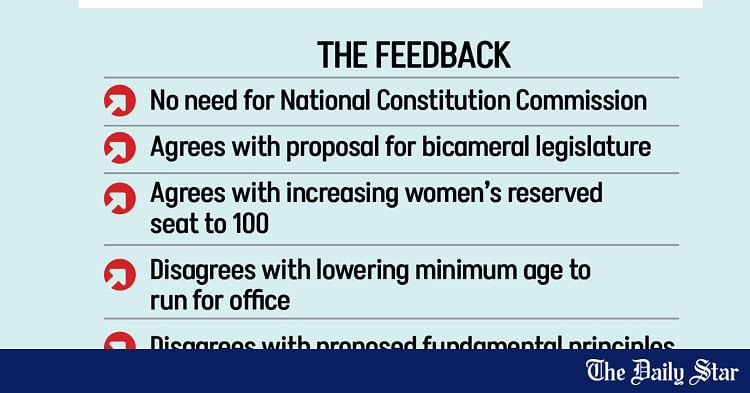Suggests one cannot be PM for three consecutive terms, submits feedback to consensus commission
The BNP does not agree with the reform proposal that an individual cannot be the prime minister more than twice.
In the comment section of the spreadsheet provided by the National Consensus Commission, the party wrote, “We disagree. Regarding the prime minister’s tenure, it would be enough to have a rule stipulating that one person will not be deemed eligible to be the prime minister for three consecutive times.”
The proposal sent by the commission says, “An individual can be the prime minister two times at most. Consecutively or through any other means, the individual cannot be the prime minister more than twice.”
The BNP’s reply seems to imply that a person can serve more than two terms as the PM, as long as there is a break after two consecutive terms.
It also disagrees with the commission’s proposal that one cannot be the PM, leader of house, and the chief of a political party at the same time. It says this matter is something for the party concerned to decide.
“Imposing constitutional restrictions on political parties is contrary to the core essence of parliamentary democracy,” reads the party’s feedback on the reform proposals.
The consensus commission on March 6 wrote to the BNP and 36 other parties, seeking their feedback on 166 key reform proposals relating to the constitution, election system, public administration, Anti-Corruption Commission, and judiciary.
The parties were asked to come up with their feedback by March 13.
The BNP submitted its feedback yesterday. So far, 15 other parties have submitted theirs.
BNP Standing Committee member Salahuddin Ahmed handed over the feedback to Prof Ali Riaz, co-chairman of the National Consensus Commission, at the Jatiya Sangsad Bhaban.
Salahuddin afterwards told reporters that BNP submitted its feedback as well as detailed opinions on five reform commission’s proposals. “We will submit detailed feedback on the remaining reform proposals in a few days,” he said.
The party does not deem it necessary to form a National Constitutional Council to handle the appointments to the Anti-Corruption Commission and Election Commission, and the posts of the chiefs of the army, navy, and air force.
It agrees with the reform commission’s proposal for an interim government and its tenure, opining that an elected parliament should make amendments to the constitution to this end.
In principle, the BNP also agrees with the recommendation for a bicameral legislature with a 400-seat lower house, or the National Assembly, and a 105-seat upper house or Senate, and the four-year tenure of both houses. But this matter too must be discussed by elected MPs.
The BNP also supports the proposal for increasing reserved seats for women to 100 but sees no need to change the current election system for women candidates.
The party rejects the proposal of nominating 10 percent youth candidates in the lower house, saying choosing candidates should be up to the parties.
It also rejected the proposal to nominate the PM by the majority of the lower house members.
The BNP dismisses the proposal to lower the minimum age to run for office to 21 years.
However, it supports the recommendation of having two deputy speakers, one of whom will be from the opposition.
The BNP disagrees with the proposal of constitutional amendments based on two-thirds majority in both lower and upper houses followed by a referendum.
It is not realistic to make all constitutional amendments through referendums, says the party. The BNP thinks it is unnecessary to change the name, The People’s Republic of Bangladesh.
It disagrees with the commission’s recommendation to adopt — equality, human dignity, social justice, pluralism and democracy — as fundamental principles; and rejects the proposal that the state must ensure pluralism, multiple religions, multiple languages and multiple cultures and the coexistence of all communities.
The party suggests that the articles of the constitution that outline the fundamental principles of nationalism, socialism, democracy, and secularism, should be restored to the pre-15th amendment form.
BNP leader Salahuddin Ahmed told reporters that it was not right to equate the 1971 Liberation War and the 2024 mass uprising.
“One of the most important parts of the constitution, which appears on the very first page, is the preamble. There is a proposal to completely change it… In this, the 1971 Liberation War has been equated with the mass uprising of 2024, which we do not consider appropriate,” he said.
The preamble is a vital part of the constitution and the commission’s suggestion to completely alter or revise it is akin to rewriting it.
PROPOSALS ON OTHER REFORMS
The BNP thinks the independence of the Election Commission will be harmed if some of the recommendations of the Electoral Reform Commission are implemented.
The BNP believes that the power to draw the boundaries of parliamentary constituencies and the national identity card service should remain with the EC.
If the NID is handed over to a separate independent institution, then the EC will have to rely on that institution repeatedly, said Salahuddin.
About public administration reform, Salahuddin said there were 26 proposals. “We agree with nearly half of them, and for the remaining half, we have our opinions and comments. Through detailed discussions, we can reach a consensus on these matters.”
About the Judiciary Reform Commission’s proposals, he said their party agreed with almost all the proposals.
The BNP does not agree with the proposal to grant the parliamentary standing committee the power to hold the EC accountable, he said.
Answering a question, he said the interim government should focus on the national election, not a referendum.
“We think the national parliamentary election should be held first.”
The BNP does not believe a constituent assembly is necessary for the extensive reform of the constitution.
Regarding the Anti-Corruption Commission reforms, he said there were about 20 proposals, of which the party agreed with 11.


